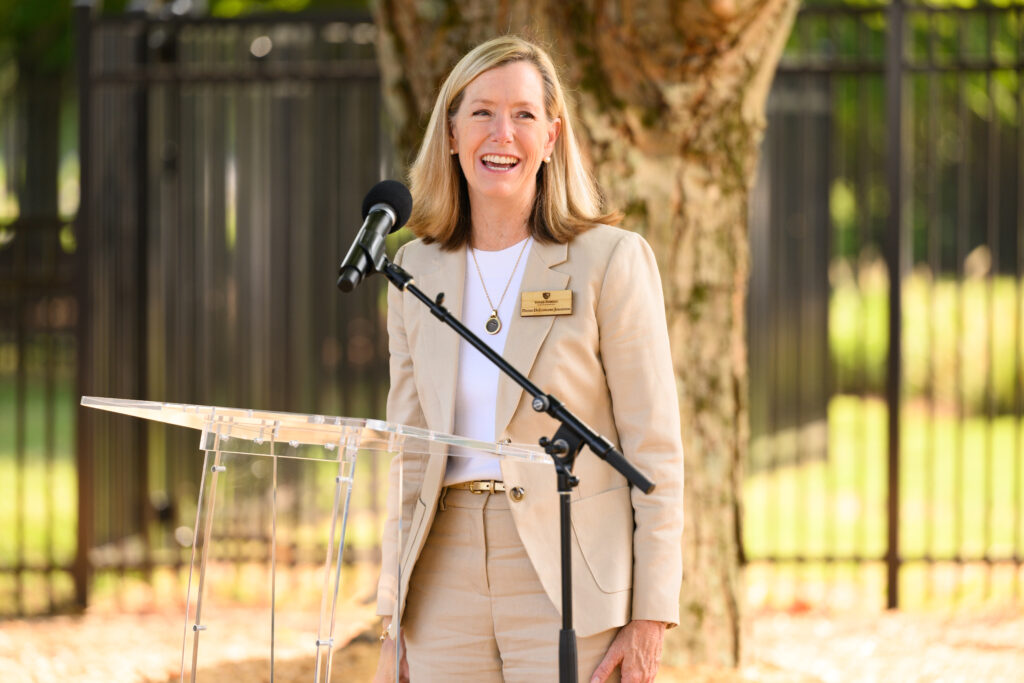Better Together
Perspectives on Sustainability, Quarterly Newsletter
By Dedee DeLongpré Johnston, Wake Forest’s Chief Sustainability Officer

Collaboration is the cornerstone of institutional sustainability. By fostering partnerships within and beyond our universities, we can leverage diverse perspectives, share resources, and mitigate risks. Together, we can develop innovative solutions to environmental and social challenges, enhancing opportunities for a more resilient and sustainable future.
You’ve never been just one person.
During his 2018 visit to Wake Forest, author and activist Raj Patel was asked, “I’m just one person. What can I do to make a difference?” He responded succinctly, “You have never been just one person.”
You have always been a member of a family, a congregation, a team, a community. Humans are not meant to be alone – isolated – bearing the weight of the world’s problems on our individual shoulders.
And yet, we’re told that our individual actions are the solution to the climate crisis, biodiversity loss, the degradation of human communities, and so much more. The slow shifting of responsibility for addressing the problems of the collective to individuals has undermined our basic instincts to come together in community to generate solutions.
When you are told that your purchasing decisions will solve something as complex and systemic as the problem of plastic pollution, for example, you are being hoodwinked – robbed of the opportunity to hold industry and government responsible for upstream issues of design, production, and distribution. We should not absolve ourselves from our role in this or any other complex problem. But without collective effort that includes collaboration among businesses and policymakers, we will be left wringing our hands over the downstream problem of disposal.
What’s the best that could happen?
The adoption of a sustainable mindset is a choice – one that is rooted in humility, curiosity, and most importantly, courage. In the face of an uncertain future, this is a choice to see the possibilities and to heed the call to action. It’s an invitation to see the world, and our collective work, through a lens of abundance. While resources might be scarce, our ingenuity isn’t.
In choosing to develop a mindset that will empower us to link arms – to switch gears and send our institutions down a new track toward a sustainable future – we are embracing the promise of innovation and shared accountability.
It takes a Forest.
In the words of 2022 Wake Forest Commencement speaker Van Jones, be a bridge. In seemingly divisive times, be a bridge.
“If you just look at the algorithms on your phone…you will believe there are too many awful people…to fix it. You will be cynical. And despairing. And wrong. The problem you have, the biggest problem you have…is that there are so many awesome people in both parties…in every racial group…in every faith.
So many awesome people who just don’t know what to do, who don’t know how to work together, who haven’t yet learned how to help each other. You don’t have an awful-people problem. You have an awesome-people problem. And it is a problem you are in a position to solve.”
Be a bridge. Ask questions to uncover common threads. Lead within and beyond the walls of Mother So Dear with humility, curiosity, and courage.
Poet Mary Oliver asks in her 1992 poem The Summer Day: what is it you plan to do with your one wild and precious life? What can we accomplish through the powerful bonds we share? If you’re a student, what will you do with this one precious Wake Forest education?
Start today.
Some of the solutions to complex issues like climate change will be so many leaps ahead in innovation and impact that we can scarcely imagine them from where we sit today.
The good news is that we can start today, with the solutions we already know we need to implement. Resources like Project Drawdown lay out a roadmap. The solutions are not a list of the 10 easy ways to save the Earth. Earth will be here with or without us. In pursuit of careers and lives that matter we can answer the call to action that is Pro Humanitate and take collective action in co-designing a sustainable future for the betterment of humanity.
The solutions on these roadmaps require institutional, governmental – global – action. Institutions like Wake Forest are capitalizing on our strengths to drive the implementation of these solutions, and our faculty are researching and seeking ways to scale innovations.
Whether it’s through education, research, internships, volunteering, or teaming up to create the next big impact venture, the opportunities to link arms and lead are endless at Wake Forest.
